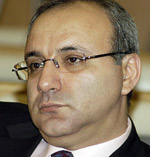During a press conference, leader of the “United Labor Party” (ULP) Gurgen Arsenyan said that the party has stopped working according to plan for three days.
“The leaders of the ULP local structures have been assigned to stop working according to plan and the party has started the pre-election campaign regime,” said G. Arsenyan.
According to him, the “pre-election campaign regime” will work the following way: ULP will present reports of its legislative activities by handing out leaflets. Arsenyan informed that eight topics have been chosen and each week a one-page leaflet with a new topic will be presented to the public for eight consecutive weeks. According to the party leader, the following will be written on the one-page leaflet:
“The ULP has made this legislative reform, these were the motives and this is what helped. The legislative reform was made and as a result, the citizen now has this, this…”
One of the journalists present at the conference reminded Arsenyan that Armenians passing out leaflets have been sentenced during the past couple of years.
“Thank you for reminding me. You know what? I’m simply saying leaflet because that’s what it is,” said the ULP leader.
It’s interesting: what’s heavier for G. Arsenyan-a leaflet or a potato?
“A kilogram of leaflets weighs the same as a kilogram of potatoes,” said G. Arsenyan.
However, he didn’t weigh the leaflet and the potato in terms of having the adequate number of votes; Arsenyan suggested that journalists compare and contrast the influence that the leaflet and the potato each have. Gurgen Arsenyan considered it necessary to mention the following: “We’re not dispersing the leaflets for sowing or eating, but rather we’re informing people of our activities.”
“The pre-election campaign begins the day after the deadline for registration of the candidates and parties and ends one day before the election,” as stated in the 5th subtext of the 18th article of the Voting Code of Armenia. However, judging from Arsenyan’s words, he doesn’t consider the distribution of the abovementioned leaflets as a pre-election campaign.
“After the eight weeks, we will move on to the next step, which is the pre-election campaign. In other words, we have to say what we have done and then present what we’re going to do during the campaign,” mentioned Arsenyan.
According to G. Arsenyan, the situation of the political field in Armenia is normal and there are no expectations for shocking events. In his words, there is no political conflict in Armenia. It’s just that there is a “clash of philosophical ideologies”. He isn’t surprised that Armenian President Robert Kocharyan saw the ULP as part of the future National Assembly during his interviews with the Armenian television channels.
“The president of the republic is the most well-informed government official. He gets the information from real sources; according to that information, the political influence of the ULP and the future possible help of the voters will aid the ULP to be represented at the National Assembly in 2007. This is evident and logical,” says G. Arsenyan.
According to Arsenyan, some Armenians are starting to appreciate the work done by the ULP both in the National Assembly and the headquarters and, as a result, “there is a larger flow of people making their way towards the party” and Arsenyan says that today there are already 17,000 members. The leader of the ULP doesn’t consider himself a know-it-all or the man that has all the answers; however, he mentions that he knows many things. But does he know that political parties are not allowed to do charities?
“Of course,” this was his response.
However, Arsenyan also believes that charities play a certain role in the activities of the political parties. He also mentioned that they are implementing “incentive projects” by paying half the tuition of students with excellent marks who have financial issues which, according to Arsenyan, has nothing to do with the party’s work or the pre-election campaign.
“We’re encouraging,” he said:
However, the ULP leader thought it necessary to emphasize that the ULP started charities before “Prosperous Armenia” and not vice versa. He considers this error as an attack against copyright laws. Arsenyan believes that Robert Kocharyan sent a “message” to the political parties out there with his interviews.
“He sent a message and said ‘take the Karabakh conflict out of your political speculations.’ Why?-because the inter-political speculation of the Karabakh conflict is not going to help the Armenian people or help quickly resolve the conflict in favor of the people of Karabakh.”
But that can’t be the monopoly of one political activist or one political party. In regard to this, Arsenyan simply said:
“Of course, I totally agree with that.”
But does Arsenyan, who claims that he’s not a know-it-all, know that Robert Kocharyan became president by speculating the Karabakh conflict? (During his interviews, Robert Kocharyan said that he considered the speculation of the Karabakh conflict during the pre-election campaign as immoral). In response to this question, Arsenyan mentioned:
“If I’m not mistaken, Robert Kocharyan became president as a result of the elections and was appointed as prime minister by order.”

